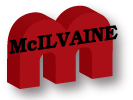
Coronavirus
Technology Solutions
October 28, 2020
A Sea Change in the Filter Industry
Lidl to Install Hospital-Grade Air Filters in
all U.S. Stores, Aims to Prevent Spread of
COVID-19
Meat Processing Giant, Tönnies Group, Leverages
Camfil Air Cleaners as Part of Pandemic
Prevention Scheme
TECMASK is an Australian Company with Pop Up
Stores in Japan
FREKA
Supplies CATE Masks
______________________________________________________________________________
A Sea Change in the Filter Industry
The true cost of one filter as opposed to
another has been traditionally limited to
considerations of energy cost vs performance.
Health has been a factor in filter decisions but
not dominant. In this pandemic era the concept
of true cost includes health factors measured in
$ billions and even $ trillions and is unlike
any challenge or opportunity previously faced by
the industry.
The evidence is now clear that Coronavirus
transmission is largely through small aerosols.
Larger droplets captured in filters and
masks evaporate releasing virus particles. As a
result tight fitting efficient masks and
highly efficient filters rated at MERV 16
and higher are needed.
With sufficient investment in these two
products the COVID battle would be won. The
value in avoided economic and social cost would
be tens of trillions of dollars. We are used to
talking ROI of years. Here we are talking ROI of
minutes.
Equally amazing is the size of the market. It is
hundreds of billions of dollars per year when
both masks and HVAC filters are included. In
many cases orders of magnitude increase in
production will be needed.
Another aspect which is new to the filtration
industry is the advantage of adding
“attractiveness to the product benefits. In fact
McIlvaine is predicting a huge market in what
could be called CATE masks. These are masks
which are Comfortable, Attractive, Tight fitting
and Efficient.

Courtesy Vogmask
The CATE and other mask market will be larger
than the sports footwear market. It will be
twelve times larger than the market for hoodies
and considerably larger than the rest of the
filtration market. The combined mask and filter
market will be nearly $750 billion/yr.

The base McIlvaine forecast has three billion
people wearing masks costing from $50 to $500
per year resulting in total yearly purchases of
$675 billion.
|
# in millions |
Cost/yr/person $ |
Cost $ millions |
|
500 |
500 |
250,000 |
|
1000 |
200 |
200,000 |
|
1500 |
50 |
225,000 |
|
Total |
|
675,000 |
The 500 million people who will spend $500 per
year will be wearing masks in low virus load
situations where the attractiveness factor
equals that for comfort, and tight fit/
efficiency.
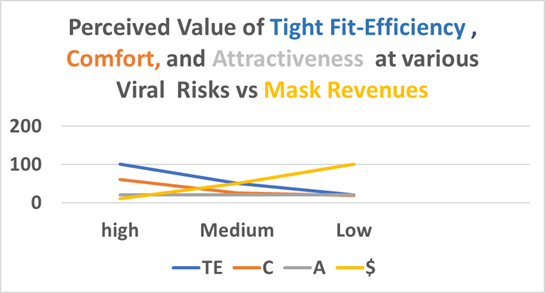
There will be large increases in filters for
local air systems including air purifiers and
fan filter units which will replace partitions
at checkout counters and on meat processing
lines. The HVAC and Transportation filter
markets will also increase substantially.
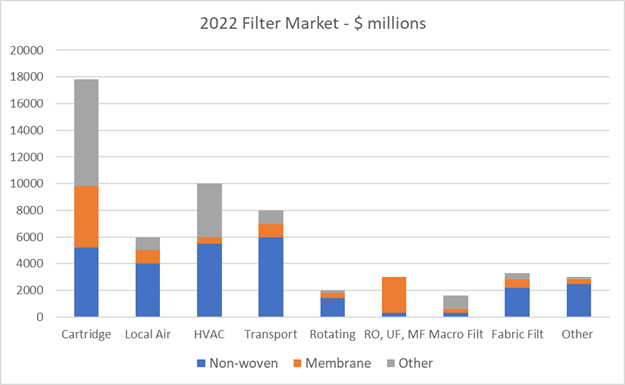
The filter forecasts are for complete filters.
The filter media accounts for 20% to 60% of the
total depending on the application. Non-wovens
and membranes account for more than other
filtration media in each of the categories. The
same non wovens and membranes used in masks can
be used in these other filter applications
Meltblowns will not predominate in CATE
masks. Membranes nanofibers and bi component
spun bond will be selected because the masks can
be reused many times.
This base forecast assumes
·
a proactive approach by the filtration industry
·
understanding of the benefits of high efficiency
media
·
the long range mask market will be robust
because of air pollution and other concerns as
well as the potential for new viruses to appear
·
media suppliers will be supplying multiple
markets and will not be hard hit by swings in
the mask market
Unlike past forecasting of the filtration market
there are very large differences between the
base, high and low forecasts. This has been a
situation with which the semiconductor industry
has had to deal with for decades. The filtration
industry therefore has a good example to follow
as it prepares for any eventuality.
Lidl to Install Hospital-Grade Air Filters in
all U.S. Stores, Aims to Prevent Spread of
COVID-19
Following recently issued Centers for Disease
Control (CDC) guidelines stating that the
COVID-19 virus can be spread through the air,
Lidl US announced it will install new air
filtration systems rated MERV 13 or higher in
all of its U.S. stores by the end of this year.
Air filters rated MERV 13 or higher, which are
typically found in hospitals, help filter out
COVID-19, according to public health and
industry leaders.
“Since the beginning of the pandemic, we have
worked diligently to protect the health of
everyone in our stores by meeting or exceeding
CDC guidelines and this measure to create
cleaner, healthier air is no different,” said
Johannes Fieber, CEO of Lidl US. “Customers and
team members in Lidl stores can breathe easier
knowing we have an added layer of protection
against COVID-19.”
Lidl US is among the first national grocery
retailers to install hospital-grade air
filtration systems across its entire store
network. Previously, Lidl stores used advanced
commercially rated MERV filtration systems.
Epidemiologists and professional associations
have recommended using high-efficiency air
filters MERV 13 or higher wherever technically
feasible to trap small airborne particles that
can transmit the virus.
Meat Processing Giant, Tönnies Group, Leverages
Camfil Air Cleaners as Part of Pandemic
Prevention Scheme
Camfil has entered an agreement with Tönnies
Group, Germany, for the implementation of an air
filtration concept at a meat production facility
at Tönnies headquarters. The aim is to set high
hygiene standards for the sensitive food area
and focus on improved indoor air quality at the
facility.
In food production facilities, air is the
invisible ingredient, and better air quality can
help the facility achieve operational excellence
and great quality product along with employee
health. Often, the lack of standards in the meat
production industry around ventilation and
limitations in the design of the facility can
lead to poor airflow along with insufficient
positive pressure in the indoor environment.
Also, to achieve the temperatures of around 6 C
to 10 C required for meat processing, Tönnies
uses convection coolers. They cool the
circulating air and return it to the room for
reuse. Scientific studies have shown that
airborne pathogens such as viruses can spread
through this air recirculation. Germs packed in
aerosols is 80 nanometers to 160 nanometers in
size and can remain active in the air for up to
three hours. These convection coolers can
distribute the pathogens in the room and
significantly increase the risk of infection for
employees.
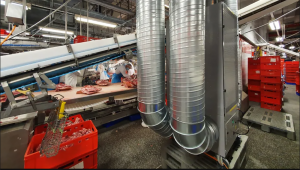
Camfil Air Cleaner at Tönnies meat production
facility.
Photo: Camfil
Due to the global pandemic, Coronavirus
(COVID-19), Tönnies Group concluded that they
want to protect their facility and employees
from these harmful pathogens in the air. They
aim to provide healthy, sustainable food with
responsible production that meets high
standards. The new multi-level hygiene solution
consists of high-efficiency HEPA air cleaners,
certified with EN1822:2019 from Camfil.
These air cleaners (CC 6000 and CC 2000) with
ProSafe HEPA H14 filters clean the indoor air
from the circulating aerosols or viruses and
provide clean filtered air to the cooling system
for circulation. The systems were positioned at
an elevated position so that the air cleaners
can get a good flow of air through the
production rooms and at the same time do not
interfere with operations.
Initial measurements, which were carried out
shortly after the installation, showed particle
reduction by more than 50%.
TECMASK is an Australian Company with Pop Up
Stores in Japan
TECMASK is an 100% Australian owned business and
a leading provider of stylish disposable face
masks whose drive is to “change the perception
of a germ mask from a commodity to a fashion
accessory”.
The concept of TECMASK (Total-Environment-Care
MASK) was created by an Australian
father-daughter duo, David and Maddy Scarf,
while travelling in Japan. Upon arriving in
Tokyo, they both felt themselves coming down
with a nasty flu post flight. In light of this,
they could understand and appreciate the use of
flu masks in the Japanese culture but were
surprised to see how many people were wearing
plain white surgical masks, especially when the
people of Japan were otherwise fashion
conscious. As days went on, they began to
question – why can’t disposable face masks be
both functional and beautiful? And so TECMASK
was born.
Combining Mr. Scarf’s 30 years of experience in
the fashion industry and his daughter’s love for
travel and marketing, TECMASK eventuated with a
range of products incorporating definitive and
colorful designs with a high efficiency PM2.5
filter.
In 2015 the TECMASK brand launched in Japan and
quickly became one of the top-selling masks in
the country. It captured the attention of a
number of world-renowned influential brands
including Vogue Japan, Elle Online, WWD Japan
and LARME Magazine.
Since the conception of TECMASK, the brand has
had the experience in opening Pop-Up Stores
around Japan, including a store at the Aoyama
Spiral Building in Tokyo, Isetan Shinjuku main
store and the Laforet building in Harajuku,
Japan.
The masks include a PM2.5 filter. the
masks
were also rigorously tested and certified by the
Nelsons Laboratory in the US and they found they
were effectively able to block 99% of BFE and
PFE particles.
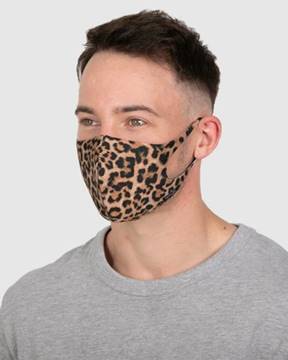
This mask sells for 20 Australian dollars and is
reusable.
It is sold in various
colors on line at the company website and
also sold wholesale.
The Sydney air port pharmacy
reports good sales.
FREKA
Supplies CATE Masks
FREKA is ergonomically designed face wear that
filters and refreshes the air you breathe. It is
made up of two key parts: a fabric exterior Wing
and an interior Insert, designed based on
ergonomics to contour the face for a superior
fit and functionality, solving the existing
issues of pollution masks such as air-leakage,
discomfort, ruining-make-up, and humidity. Made
for urban dwellers living in stressful, polluted
environments, FREKA offers Air-Revitalisation
Technology. Users can choose from two
replaceable filters created with a four layer
FREKA Filter Technology that purify inhaled air.
The Air Filter 95 Filter filters out over 95% of
airborne pollutants including Particulate Matter
PM0.3-PM2.5, dust, pollen, odors, and exhaust
fume.
Every face is uniquely complex and the company
found it was incredibly difficult to find
something wearable that comfortably fits any
face shape or size. Freka is created to adapt to
the shape of the face and does not compromise
between aesthetics and functionality. FREKA is
designed to contour the face for a great fit and
features a unique Internal Ventilation System
and Air-Revitalisation Technology for easy
airflow, and fresh, rejuvenating air. Living in
highly polluted urban areas with high
particulate matter and dust, or during seasons
with high pollen levels can stress your mind and
body. It can cause respiratory problems, hay
fever, and generally affect your mood. FREKA is
made for the urban dweller who wants to breathe
pure and fresh air, and is seeking something of
superior design and functionality.
FREKA features two options of a replaceable
filter created using a four layer FREKA Filter
Technology that filter out Particulate Matter
PM0.3-PM2.5, dust, pollen, odors, and exhaust
fumes. The scent of the Hinoki Vitaliser brings
the pure and calming experience of nature
directly to the wearer.
For a mask to work properly, it is extremely
important to create a complete seal on the face
that is both comfortable and air tight. The
sealing needs to follow the lines of the face as
flawless as possible and distribute the pressure
in such a way that sensitive areas are avoided.
A flawless fit reduces the risk of contaminated
air entering the mask unfiltered.
The inner airflow dictates the ease of breathing
for the wearer. Small disturbances in the
airflow can cost energy which in turn makes it
more difficult to breathe. For this reason,
everything needs to be arranged to let the air
flow from the filters inside as efficiently as
possible, whilst exhaled air needs to be free to
exit the mask quickly.
Filtering the air is done in multiple stages to
ensure all contaminations are removed. A
particle filter removes all solid and liquid
contaminants like pollution and bacteria.
Following, activated carbon fibre removes gasses
and odors from the air. This will leave you
breathing in the freshest air possible.
FREKA offers an option of two replaceable
filters, created with a four layer Freka Filter
Technology, that purifies inhales air. The Air
Filter 95 filters out over 95% of airborne
pollutants including Particulate Matter
PM0.3-PM2.5, dust, pollen, odours, and exhaust
fumes. Using 'TORAY' high performance Activated
Carbon Filter. Air Filter 95 Filter: Suitable
for use in very polluted urban environments.
Recommended for use in cities with high
particulate matter (PM0.3-PM2.5) levels. Filter
16 with Vitaliser Suitable for dusty and
moderate-highly polluted urban environments.
Also recommended for those seeking protection
from pollen.
FREKA consists of three main components. The
Wing protects filter, blocks 99% of UV rays. It
is designed with its 3D shape to complement the
shape of your face. The Filter, created from the
highest grade filter combined with a layer of
Activated Carbon Fibre, ensures fresh air.
Finally, the Insert creates a comfortable and
air tight sealing whilst also improving the ease
of breathing.
The 3D shape of the wing follows the contours of
your face and avoids sensitive areas. Leading to
its unique and innovative “U-shape.
FREKA’s four layered filter helps to ensure you
breathe only the finest air. While one of our
layers protects against over 95% of PM2.5 (small
solid objects the size of one hundredth of a
hair), Activated Carbon Fibre layer removes most
gaseous pollutants such as SO2, and NO2.
Designed to the highest standards through
in-depth facial analysis, the Insert adapts to
your face for a perfect seal and remarkable
comfort.
The Nose Fit Adjuster features a ballooning
design that adjusts to your nose using
Scissor-Movement technology to provide a
customized fit for effortless breathing.
The Internal Ventilation System has a unique
Exhalation Valve with flip movement function,
which allows warm and humid air to exit freely
from the Insert.
Aside from the Vitaliser and Filter which should
be replaced after a maximum of two weeks from
being removed from their individual sealed
packaging, the Insert and Wing can be used for
up to three years with proper maintenance.
Wing: Handwash in lukewarm water. Iron only on
lowest heat if necessary. Insert: Handwash in
lukewarm water or clean with gentle disinfectant
wipe. Filter: Depending on pollution levels and
usage, the average usage period for each filter
is about 7 days. They recommend changing the
filter after a maximum of two weeks’ usage. How
long can the Filter and Vitaliser be used for
before I need to change it? Filter: The average
usage period for the FREKA Micro Particle
Filters is about 7 days depending on pollution
and usage. Depending on your usage and
geographical location you may find you need to
replace your Filter and Vitaliser any time
between 3-10 days. Vitaliser: Effective for an
average of 5-7 days. Should be changed with the
filter. Regardless of usage, they recommend
replacing the Filter and Vitaliser two weeks
after being removed from their sealed packaging.
As the filter is exposed to unhygienic external
environments such as pollution and bacteria once
it is opened from packaging, changing the filter
often ensures the user is always breathing clean
and pure air.
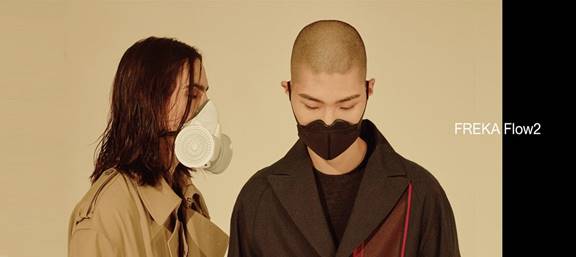
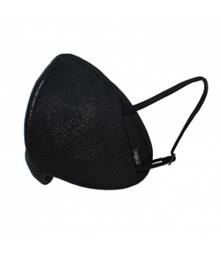
This Flow 2 mask is sold as a package of four
for HK 1275
(US
$164 or $41 each)
